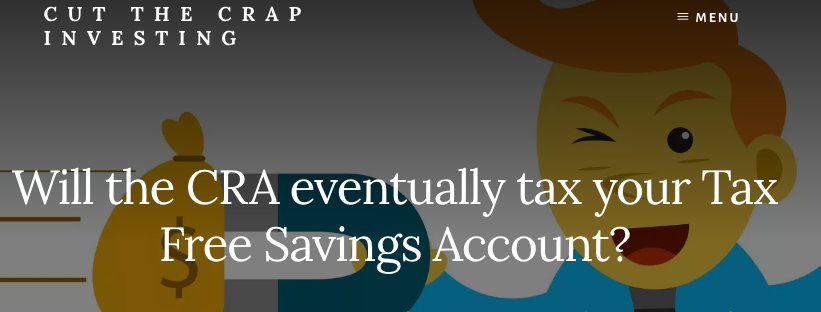By Dale Roberts, Cutthecrapinvesting
Special to the Financial Independence Hub
As it stands today the Tax Free Savings Account or TFSA is true to its name. It is tax free on all counts. The interest or income or capital gains created in the account are not taxed. When you take money out of your TFSA you pay no tax. Net, net, your money grows tax free and you can spend it tax free.
But will this change in the future when Canadians have amassed considerable sums and are able to generate significant tax free income in retirement? Will the CRA eventually tax your Tax Free Savings Account? The TFSA program was launched in 2009 with a maximum of $5000 of contribution space. The contribution allowance has been increased to reflect inflation and now sits at $6000 annual.

In 2019 it’s not uncommon to see a Canadian who has maximized their TFSA contributions and who has invested their monies sitting with a six figure balance. In fact they might even approach a balance of $110,000 or more in a TFSA. For a Canadian couple that is $200,000 or more in potential tax free income.
In another 10 years that couple could easily have a combined $500,000 in TFSA monies. Of course they’ll need the cooperation of the stock markets that have been more than generous over the last 10 years, especially if you throw that roaring US stock market into the mix.
A massive TFSA gives Canadian retirees options
When Canadian retirees begin to accumulate sizable TFSA accounts they can start to execute some very opportunistic retirement strategies. And that might include accessing the government program known as the GIS or Guaranteed Income Supplement. That’s designed to help lower income seniors.
In a guest post on Cut The Crap Investing Financial Planner Graeme Hughes outlined how spending our own RRSP monies can negate potential GIS payments and that is one of the most common mistakes made by Canadian retirees. From that post …
What’s less well-known is the impact RRSPs can have on lower-income seniors, particularly those retiring with only the Canada Pension Plan (CPP) and Old Age Security (OAS) amounts for pensions. In many cases these seniors would also get the Guaranteed Income Supplement (GIS), which is an add-on benefit to the OAS. However, the GIS is an income-tested benefit and RRSP withdrawals absolutely count as income for this purpose.
So often I have seen seniors withdrawing from their modest RRSPs in retirement while not realizing that, had they not been making those withdrawals, they would have been receiving valuable GIS benefits rather than drawing down retirement savings. By better allocating their resources prior to retirement they could have greatly improved their overall retirement picture.
And that seems like fair and needed financial planning for those with modest RRSPs. That’s all within the spirit of the OAS and the GIS program that is designed for retirees with lower incomes. But Graeme goes on to outline that some retirees with greater assets can also take advantage of the GIS program by using their TFSA accounts.
Even for wealthier retirees with substantial savings but no employer pensions, it is possible to obtain 7 years of GIS benefits by drawing down TFSAs or savings between age 65 and 71 and letting the RRSPs grow until mandatory withdrawals start at age 72. Those benefits can be worth tens of thousands of dollars and should absolutely be taken into consideration when planning for retirement.
TFSA withdrawals do not show up on your tax filing as income. The CRA only keeps track of your TFSA contributions and withdrawals. And certainly make sure you understand how the program works so that you can avoid any over contribution penalties. Here’s a link to the TFSA essentials on the CRA site.
Given that, a retiree could take out $20,000 for spending from TFSA ($40,000 for a couple) and those monies do not count as income. Those retirees only source of reportable income might be CPP and OAS payments – they might qualify for GIS or reduced GIS. But these retirees are certainly lower income seniors. They may have an owned-home worth $1 million or more, each with RRSPs in the $500,000 range (or more), those six figure TFSAs and perhaps some taxable investment accounts throwing off tax efficient dividend income that qualifies for the Canadian dividend tax credit. They might have a modest amount in a savings account that is earning very little and not greatly affecting their income statement.
These retirees might have a net worth of $2,000,000 or more and yet they still qualify for that Guaranteed Income Supplement. When that occurs, it’s totally legal and within the current rules, but it’s certainly not within the spirit of the GIS program designed to help lower income seniors.
Will most Canadians be outraged?
I’m guessing that most Canadians will be up in arms when they hear or read of this opportunistic financial planning. Jonathan Chevreau asked the question on Twitter and it generated a vigorous debate. Well that is, readers were already taking issue with the potential use of GIS for those with considerable assets.

Other Twitter threads spun off and it was more than an interesting debate and exchange, but all in good Canadian and very polite fashion.
Graeme had offered …

And on the potential fix Geoff Shaeffer suggested …

He did not get an argument in many quarters.

Certainly it will be tricky and unfair to treat any TFSA withdrawals as income, as those withdrawals may not be income to cover basic living costs. Perhaps the monies are directed to help pay for a child’s or grandchild’s education, or an aging parents medical costs. Perhaps it’s a one-time emergency fund need.
How would the CRA get their pound of flesh?
And how would the government means-test TFSA assets? How can they penalize Canadians for simply owning large TFSA accounts? It’s possible they could simply start to tax TFSA accounts above a certain threshold. That would mean that the Tax Free Savings Account would no longer be a Tax Free Saving Account. Perhaps they’d tax 1% or 2% of TFSA assets above $150,000.
Other readers had suggested that total net worth should be taken into consideration. But why would we target a Canadian who is house rich and perhaps truly income poor?
It’s more than tricky when the government agencies want to close what they see as loopholes or tax unfairness. We are experiencing that in the investment arena with the Department of Finance going after Horizons tax efficient swap based ETFs. They’ll have to rewrite how corporations are taxed after Horizons moved the funds to a corporate structure.
Will the CRA tax those TFSA accounts? Should the CRA tax those TFSA accounts in certain situations? Keep in mind that Canadians have already been taxed on the monies that are moved into their TFSAs. Should they be taxed twice? If you think that those accounts should be taxed, what is a fair process? What is a fair tax rate? How do we close that GIS loophole?
There is much to play out on this big question. All said, I’d suggest that you do not avoid the TFSA program based on any speculation. It’s a wonderful program and you should use it to full advantage. Whether you use it in retirement to access GIS payments, well, that’s a question you might also have to answer one day.
Thanks for reading. Leave your comments on this post or see me and the gang on Twitter.
Dale
 Dale Roberts is the Chief Disruptor at cutthecrapinvesting.com. A former ad guy and investment advisor, Dale now helps Canadians say goodbye to paying some of the highest investment fees in the world. This blog originally appeared on Dale’s site on Sept. 10, 2019 and is republished on the Hub with his permission.
Dale Roberts is the Chief Disruptor at cutthecrapinvesting.com. A former ad guy and investment advisor, Dale now helps Canadians say goodbye to paying some of the highest investment fees in the world. This blog originally appeared on Dale’s site on Sept. 10, 2019 and is republished on the Hub with his permission.




Hey Dale,
Just wanted to correct some wording. You say with the TFSA limits that “For a Canadian couple that is $200,000 or more in potential tax free income.” This statement in that paragraph is incorrect. The $200,000 is income that was already taxed and placed in the TFSA. It is withdrawn tax free. The only detriment to the government is the fact that any income earned on the $200,000 is “potential tax free income”. At future forecasted real rates of return for a 60/40 balanced portfolio of around 3-5% (John Bogle/Vanguard), this only amounts to tax free income of $6,000 to $10,000, not the $200,000 as you have it written. Like I said, the $200,000 placed in the TFSA was earned and is after tax income, so it would be withdrawn tax free but not as income, but rather as original contributions.
Regards,
Brian Vroomen
Thanks Brian, yes we’ve certainly paid the tax on those monies already. They’ve then grown tax free and you can then take them out without further taxation. At that point in retirement, they are available tax free. But yes, the initial dollars are after tax.
And certainly, moving forward, perhaps rates of return are not as generous. Who knows :)
Dale
Realistically though, how many individuals/couples will be able and wanting to take advantage of this “loophole” to use their TFSA’s to reduce taxable income enough to collect GIS? I’m guessing lower income people will have a difficult time building up a large enough TFSA to take advantage of it. I’m also guessing upper middle class and wealthy people will need more taxable income to meet their spending goals and a few hundred dollars a month of GIS would not be worth contorting over. If a few middle class savers end up being able to take advantage of it, I would not have a problem with it.
Hi Jason, I understand it’s a bigger group than we might think. For many with modest to decent RRSP it’s simply the right thing to do. The more ‘rich’ probably would not bother with such a strategy, I agree. But I am in the camp that whoever might take advantage of it – good for you. It’s Canada we are taxed so much along the way. I’m not sure I would do it, if I could. That’s a tough one.
This is not a “loophole”. Our American friends have had Roth IRAs for over 20 years, which are essentially the same as Canada’s TFSAs. The only difference is Canadians depositing after-tax earnings into TFSAs were taxed harder prior to the deposit by the Liberal government.
Thanks Jake, certain “loophole” would have to be in quotes, and that would be from the perspective of tax collectors for the most part. Any loophole from a Canadian taxpayer perspective might be the creative use of TFSA (by a taxpayer with very generous net worth and assets) to access a program such as GIS.
Again, I have no problem with that, as were are taxed enough already as you point out. We will all have our opinions on the matter. And likely, opinions that won’t count in the end.
Dale
The question should not read “will the CRA tax TFSAs rather will the government mandate the CRA to tax TFSAs. It is my understanding that those in government make policy, not some un-elected official in the CRA.
The rich give but they usually take it away!
Your comment on my comment is awaiting moderation!